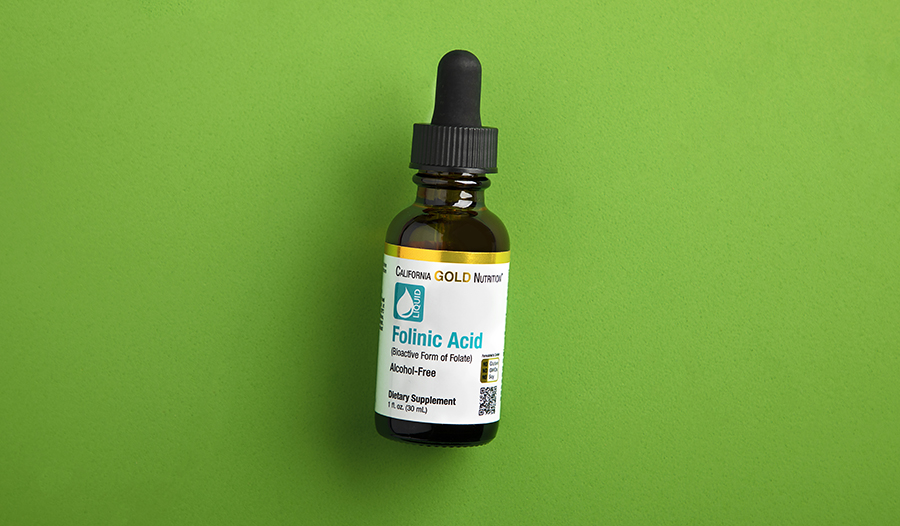Do You Need A Folic Acid Supplement? Here Are 3 Important Benefits

Folate is involved in many essential processes in the body, including cell division, making nitrogenous bases that are involved in our genetic material, and helping with the maturation of red blood cells.
Some sources of folate in the diet include leafy green vegetables like spinach, lettuce, and broccoli. Folate can also be found in lean meats, milk, and eggs. Despite the abundance in many foods, the daily intake levels of folate are lower than the recommended dosages.
This article will review the importance of adequate folic acid supplementation.
What is Folic Acid?
Folic acid is the synthetic form of the naturally occurring folate, Vitamin B9. It is an essential vitamin, meaning that we need to get it from our diet since we cannot make it ourselves.
Folate is a water-soluble vitamin that plays a role in the biosynthesis of our genetic material. It is highly involved in our cellular division from the moment we are conceived and is essential in maintaining normal levels of red blood cells in our blood.
Folic Acid vs. Folate
Folic acid and folate are used interchangeably, but folate generally refers to the form of the vitamin that is normally found in food without fortification. On the other hand, folic acid is used in supplements and fortified food items like pasta, bread, and some breakfast cereals.
One of the reasons why folic acid (instead of folate) is used in supplements and fortified foods is that folic acid is more stable. Folate tends to be broken down easily by light and heat, making it difficult to incorporate into many of our foods and supplements. The body easily absorbs folic acid, and studies have shown that it can increase blood folate levels across different populations.
3 Important Functions of Folate in the Body
Your body needs folate for a vast array of critical functions.
Repairs Genetic Material
Folate is needed to make and repair genetic material like DNA. For example, when the skin is exposed to the sun without sunscreen, the sun’s ultraviolet rays can cause a lot of damage to the genetic material in your skin cells. Folate then works to help repair the damage by adding a methyl group to the nitrogenous bases of DNA.
Aids Cellular Division
Additionally, your body’s cells are constantly dividing; whether it is the cells in your mouth, your intestines, skin, red blood cells, or immune cells, there is constant division going on daily in your body. Folic acid ensures that cellular division goes as planned and that all your cells contain the exact copy of genetic material in them, leading to a smooth cellular division process.
Facilitates Protein Synthesis and Red Blood Cell Maturation
Folic acid also helps the body convert homocysteine to methionine, an amino acid used for protein synthesis. Finally, folic acid helps in the maturation of red blood cells, helping your levels stay within normal limits.
How Much Folic Acid Do I Need?
The recommended daily intake of folic acid is 400 micrograms (mcg) per day. These values vary by country, with Australia recommending about 320 mcg per day and the European Union recommending 200 to 300 mcg per day. But for the general population, upper intake levels of 1000 mcg have been established as not having any adverse health outcomes.
Despite these levels, folate or folic acid consumption can sometimes be way below the recommended daily intake for some populations, with the Centers for Disease Control and Prevention reporting that in the United States, people consume about 140 mcg of folic acid per day from fortified foods.
The World Health Organization (WHO) has established that the recommended daily dose of folate should be 400 to 800 mcg per day for women trying to get pregnant. Obstetricians will generally prescribe iron-folic acid supplements like prenatal vitamins before and during pregnancy due to the importance of folate in the development of the fetus. Most prenatal vitamins contain about 1 milligram (mg) of folate, which is 1000 mcg, well above the recommended daily intake.
Folate Deficiency
Many factors contribute to people having low levels of folate in their bodies and their diets. The primary factor includes poor dietary intake of leafy greens and vegetables or fortified grains or inadequate supplementation. Certain conditions can also affect the absorption of folate in the digestive system, which can lead to deficiency.
The consumption of excess alcohol can also lead to low folate levels in the body since it prevents the body’s ability to absorb folate and decrease its ability to store it in the liver. Some medications used to treat serious conditions can also impair the absorption of folate, requiring supplementation.
Finally, pregnancy is a time in a woman’s life that will require her to supplement with folic acid as the developing fetus is undergoing many cellular divisions and growth per day from the moment of conception.
Folate and Pregnancy
Folate is extremely important if a woman is trying to get—or is—pregnant, as it is pivotal in the normal development of the spinal cord and brain. Following several research studies, supplementation with folic acid and prenatal vitamins has shown a decrease in the incidence of neural tube defects by 71% in pregnant women.
When the baby develops in the first weeks of pregnancy, it is only a clump of cells that start to divide and form a cluster of cells. This cluster then folds, and part of it folds into a tube called the neural tube, which will eventually become the child’s spinal cord and brain.
Waiting until the first prenatal visit—within the 6th to 12th week of pregnancy—to start folic acid consumption will not help prevent neural tube defects since the baby’s essential organs have already started to develop by this time. Therefore, to help prevent neural tube defects, it is pivotal for women to start folic acid supplementation of 400 mcg per day before trying to get pregnant.
Folic acid also helps the body convert homocysteine to methionine, an amino acid used for protein synthesis. Homocysteine is naturally produced by the body when proteins are broken down. It is not harmful at low levels, but it can lead to serious blood conditions at high levels. Women with elevated homocysteine levels are believed to be at higher risk for miscarriage, pre-eclampsia, and even preterm labor—most likely due to the elevated homocysteine levels.
Why do homocysteine levels become elevated? Methylfolate, the active form of folic acid, plays a role in converting homocysteine to methionine (a harmless amino acid). So if methylfolate does not have adequate levels of folic acid to signal it to convert homocysteine to methionine, homocysteine can build up to concerning levels.
Side Effects of Folic Acid
Folic acid supplementation is generally well-tolerated, and there is no definitive evidence in the medical literature indicating adverse effects due to folic acid. This means that folic acid alone is usually safe. There have been reports of rare instances of nausea, vomiting, or diarrhea with folic acid supplementation, but it is still generally a well-tolerated supplement when taken alone.
When taking supplements, be sure to read the label to determine what other vitamins, minerals, and herbs are contained. These may have different recommended daily intakes than that of folic acid.
The Big Picture
Your body stores folate in the liver, with storage levels ranging from 10-30 mg, but these levels can rapidly decrease without adequate nutrition and supplementation. Consider supplementing your diet with 400 mcg of folate per day to replenish your daily folate losses.
Remember, your cells are constantly dividing, and you can help them divide with folate supplementation.
If you’re trying to get—or you think you already are—pregnant, start taking a prenatal vitamin that contains folic acid or folate, as this will help prevent neural tube defects. Above all, eat a diet filled with leafy greens and vegetables, as this will help you maintain your body’s folate stores and will be packed with other vitamins and antioxidants.
References:
- Bhandari J, Thada PK. Neural Tube Disorders. In: StatPearls. Treasure Island (FL): 2021. https://www.ncbi.nlm.nih.gov/books/NBK555903/
- Dietary Reference Values for folate. European Food Safety Authority. https://www.efsa.europa.eu/en/efsajournal/pub/3893.
- Folate (folic acid). Mayo Clinic. https://www.mayoclinic.org/drugs-supplements-folate/art-20364625. Published February 23, 2021.
- Folate and Folic Acid in Pregnancy. American Pregnancy Association. https://americanpregnancy.org/getting-pregnant/infertility/folate-vs-folic-acid-68699/. Published April 23, 2021.
- General Information About NTDs, Folic Acid, and Folate. Centers for Disease Control and Prevention. https://www.cdc.gov/ncbddd/folicacid/faqs/faqs-general-info.html. Published April 11, 2018.
- Merrell BJ, McMurry JP. Folic Acid. In: StatPearls. Treasure Island (FL): 2021. https://www.ncbi.nlm.nih.gov/books/NBK554487/
- Vipercore-13. Folate. https://www.nrv.gov.au/nutrients/folate. Published January 1, 2005.
FERAGAT:SAĞLIK MERKEZİ tanı koymayı hedeflememektedir...
















































































 İçindekiler
İçindekiler















